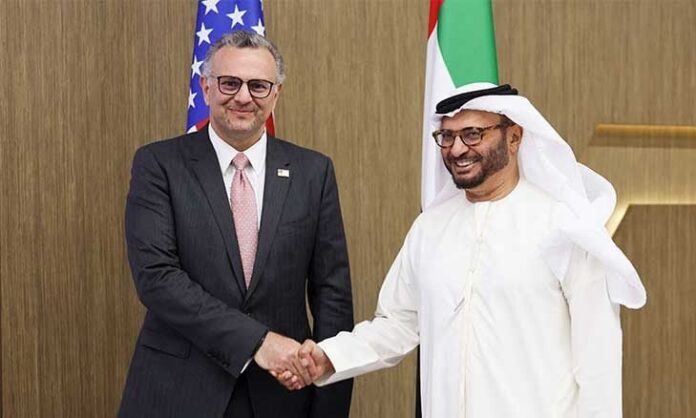Masad Boulos, U.S. President Donald Trump’s advisor for African and Arab affairs, stated on Tuesday during a press briefing in Abu Dhabi that Trump considers ending the war in Sudan a priority, and that Washington submitted a strong peace plan to the Sudanese army and the paramilitary Rapid Support Forces (RSF), but it was rejected by both sides.
Boulos added in a joint press conference with Anwar Gargash, diplomatic adviser to the UAE president, that he reviewed the RSF’s unilateral announcement to cease hostilities and expressed hope that “this declaration will hold and both parties will abide by it.”
He stressed that the U.S. administration condemns the atrocities committed by both the RSF and the Sudanese army, emphasizing the necessity of holding those involved accountable for the violations.
Responding to recent remarks by Sudanese Army Commander General Abdel Fattah al-Burhan, who accused Boulos of repeating a “false narrative” about the war, Boulos described al-Burhan’s statements as “based on false facts” without going into further detail.
He also noted that Washington has proposed multiple peace initiatives over recent weeks, including a humanitarian truce, expressing hope that both sides would accept the comprehensive draft presented by the U.S. government.
Boulos mentioned that if the U.S. decides to designate the Muslim Brotherhood as a terrorist organization, it may scrutinize the activities of its branches in the region.
Earlier, in a speech to army leaders, al-Burhan rejected “half-measures” and criticized the Quad mechanism mediation efforts by the United States, Saudi Arabia, Egypt, and the UAE, claiming these proposals would “dissolve the army and security bodies while maintaining the RSF,” a notion he deemed unacceptable.
He criticized the UAE’s participation in the mediation and accused it of supporting the RSF, while also expressing reservations about Boulos’ role, stating that he “attempts to impose solutions that do not consider Sudanese state concerns.”
Al-Burhan emphasized that the government presented an alternative roadmap based on the withdrawal of the RSF from territories it captured after the Jeddah platform discussions, gathering them in agreed-upon locations to enable the return of the displaced and initiate an internal political process.
U.S. President Donald Trump announced last week his intention to intervene to stop the destructive conflict that erupted in April 2023, leading to widespread hunger, ethnic killings, and massive displacement.
The Sudanese army has previously objected to the UAE’s involvement in peace talks and insisted it would not accept a ceasefire unless the RSF withdrew from civilian areas.
The army also accused the UAE of arming the RSF, allegations denied by the Gulf state.
On Monday, RSF leader Mohammed Hamdan Dagalo “Hemeti” declared his forces’ agreement to a three-month humanitarian truce, citing international efforts and Trump’s initiative.
He affirmed that the RSF and its allies are committed to “ceasing military operations during the truce, facilitating humanitarian work, and ensuring aid reaches all affected regions without hindrance.” He pledged to protect humanitarian workers, offices, and warehouses of international organizations.
Hemeti also agreed to establish a field monitoring mechanism for the truce supervised by the Quad countries (the United States, Saudi Arabia, the UAE, and Egypt), alongside the African Union and IGAD, and committed to holding accountable any elements proven to have violated civilians’ rights.
He described the truce as “a first step towards ending hostilities and reaching a comprehensive political solution,” supporting an inclusive political path that excludes the Islamic Movement, the National Congress Party (Sudan’s former ruling party), and their affiliates.
Sudanese political forces welcomed the RSF’s unilateral cessation of hostilities, viewing it as an opportunity to address the humanitarian crisis and facilitate political progress.
The National Umma Party called the three-month truce a positive step, recognizing the RSF’s acceptance of the humanitarian ceasefire proposal by the international Quad as essential to alleviating civilian suffering.
The party urged the military leadership to positively engage with the proposal and declare its own ceasefire, helping open safe corridors and enabling civilian movement, thus creating conditions for an inclusive political process.
It renewed support for the Quad initiative and regional and international efforts to end the war, warning that continued fighting poses a serious threat to national unity amid economic decline and deteriorating services.
The party also called on political and civil forces to unify, overcome differences, support peace efforts, and combat hate speech.
Khaled Omar Youssef, a leader of the Sumood Alliance and deputy head of the Sudanese Congress Party, welcomed Hemeti’s ceasefire declaration, calling it “a responsible position worthy of praise.”
He expressed hope that the armed forces would follow suit to “put an end to the war,” emphasizing that peaceful solutions remain the shortest and safest path to resolving Sudan’s crises


